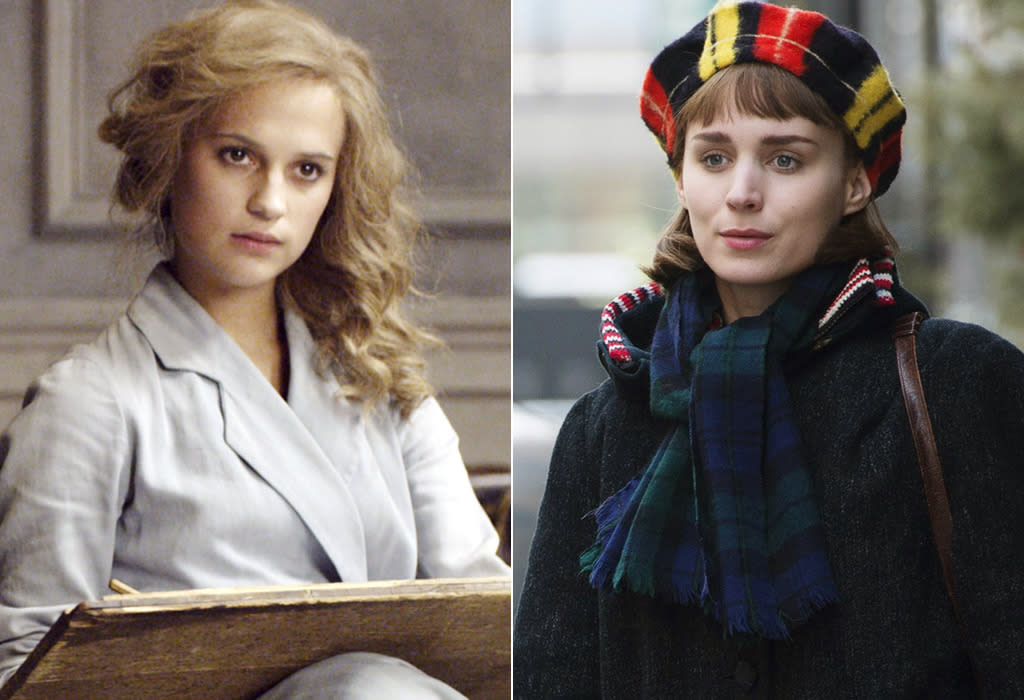Alicia Vikander, Rooney Mara, and the Most Egregiously Miscategorized Oscar Nominees

Imagine if an NFL team could decide unilaterally which conference to play in every year. That’s essentially the power a movie studio has when it comes to Oscar campaigning, particularly when deciding whether actors fall into lead or supporting categories.
Such flexibility can make for some shady maneuvering, with studio shot-callers and awards strategists downplaying the size or impact of an actor’s role — or, in rare cases, exaggerating it — to shoehorn their stars into the races they have the better chances of winning.
Related: 2016 Oscar Predictions: Our Picks in Every Category
There are two particularly egregious examples of this so-called “category fraud” in the 2016 Oscar race: Alicia Vikander is the favorite to win Best Supporting Actress for The Danish Girl, despite the fact that she is the historical drama’s clear-cut female lead. She’ll be up against Rooney Mara, who is the clear-cut co-lead in Carol, alongside Cate Blanchett.
Here is a look at these and some other notable examples over the years.
Alicia Vikander, The Danish Girl (2015)
As mentioned, the Swedish breakout is the frontrunner in Best Supporting Actress, and does indeed deliver an Oscar-caliber performance as portrait artist Gerda Wegener. But she has as much — if not more, depending on whose estimations you believe — screen time as co-star Eddie Redmayne, who is competing a nominee for Best Actor. (Vulture put that number at more than 73 minutes).
Say what you want about the Golden Globes and their wonky definition of comedies, but at least the Hollywood Foreign Press Association can overrule a studio’s recommendation, and this year it placed Vikander in the Best Actress pool (as did the BAFTAs), which opened the door for her to earn an additional nomination for her truly supporting role in Ex Machina.
Rooney Mara, Carol (2015)
Enthusiasts of Todd Haynes’s elegant lesbian romance have been complaining about The Weinstein Company’s decision to split their co-leads into two different categories since word first broke about it in September. The movie may be called Carol, but it’s about Carol and Therese.
What makes Cate Blanchett a Best Actress contender, and Rooney Mara a Best Supporting Actress nominee when the film clearly makes no such delineation? Is it a seniority thing, Blanchett being older and having previously been nominated? The Aussie wasn’t saying when I asked her about it last week, but you get the distinct feeling the actors have no say in it whatsoever.
Jake Gyllenhaal, Brokeback Mountain (2005)
Gyllenhaal is in nearly every scene in the heartbreaking romantic drama, yet as with Carol, the studio didn’t want its actors competing against each other, and placed Heath Ledger in the lead race. Gyllenhaal ultimately lost to George Clooney (Syriana), who, ironically, some believed should have been in the running for Best Actor.
Jennifer Connelly, A Beautiful Mind (2001)
In another move that closely mirrors the Vikander decision, Connelly was placed in the Best Supporting Actress category for the Oscars despite a hefty role as Alicia Nash, the wife of Russell Crowe’s troubled mathematician. The SAGs nominated her in the lead category, and she won Best Featured Female Actor at the AFI Awards. The Oscar move worked, and Connelly won.
Ethan Hawke, Training Day (2001)
It’s right there in the synopsis: “A rookie cop goes on a 24-hour training course with a rogue detective.” Hawke was a co-lead as that rookie cop, but of course Denzel Washington, in a much showier role as the rogue detective, was due for a Best Actor Oscar (which he won). Still, many considered Hawke lucky to sneak into the Best Supporting Actor race, so he was probably just happy to be nominated.

Anthony Hopkins, The Silence of Lambs (1991)
His portrayal of maneater Hannibal Lecter was so skin-crawling — and ultimately so iconic — that it’s easy to forget Sir Tony was only onscreen for 16 minutes. Not exactly Best Actor screen time, but it’s the category in which Hopkins won his first and only Oscar (he’s been nominated three times since.) Hopkins beat out Robert De Niro for Cape Fear — also a questionable “lead” (but no doubt a deserving nominee). Jack Palance should have thanked them both, right before those one-armed pushups.
Tatum O’Neal, Paper Moon (1973)
O’Neal became the youngest Oscar winner ever when, at 10, she won Best Supporting Actress for playing the precocious Addie Loggins opposite her dad, Ryan O’Neal, in this comedic drama. But Addie is the film’s driving force, and really should have been in the Best Actress race, yet she was likely relegated to supporting because of her age. Wonder if she would’ve beaten Best Actress winner Glenda Jackson in the since-forgotten A Touch of Class?
David Niven, Separate Tables (1958)
If you think Anthony Hopkins’s screen time was paltry at 16 minutes, consider Niven’s. The English actor was only in this stage adaptation for 15 minutes and 38 seconds — yet won Best Actor, beating out Paul Newman (Cat on a Hot Tin Roof), Tony Curtis, and Sidney Poitier (both for The Defiant Ones), as well as Spencer Tracy (The Old Man and the Sea).
Side Note
For what it’s worth, the category gerrymandering doesn’t always work. The most famous example came in 2008, when The Weinstein Company attempted to run The Reader star Kate Winslet in Best Supporting Actress so that she wouldn’t compete with herself (for Revolutionary Road) in Best Actress. (In another inane Oscar rule, an actor can’t be nominated twice in the same category.) Academy voters ignored that placing, and nominated Winslet in Best Actress for The Reader … where she ultimately won. So, even when they lose, sometimes they still win.

 Yahoo Movies
Yahoo Movies 

